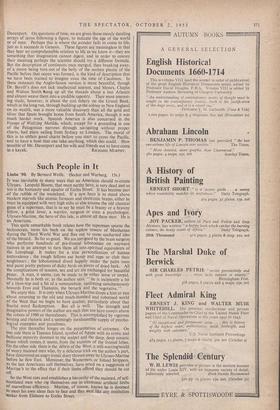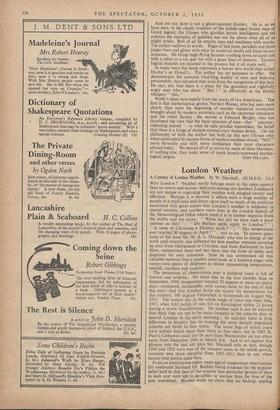Such People in It
Limbo '90. By Bernard Wolfe. (Secker and Warberg. 15s.) IT was inevitable in many ways that an American should re-create Ulysses. Leopold Bloom, that most earthy hero, is very dead and so too is the humanity and squalor of Eccles Street. It has become part ..of the rubble of the wasteland. If a new hero is to stand above modern marvels like atomic furnaces and electronic brains, either he must be equipped with very high stilts or else assume the old classical guise of a superman, that is to say he must be a brainy or a brawny fellow, a great lover, a warrior, surgeon or even a psychologist. Ulysses-Martine, the hero of this tale, is almost all these men. He is an American.
This quite remarkable book relates how the superman spurns the technocrats, turns his back on the topless towers of Manhattan during the Third World War and flies out to some uncharted isles of the blessed. So far so good. We are intrigued by the brain surgeon who performs hundreds of pre-frontal lobotomies on wayward natives in an attempt to turn them all into-spiritual equivalents of the Lotophagi. It makes for a nice personification of human ambivalence : the 'rough fellows eat hemp and rape or club their neighbours ; the lobotomised drool happily under the palm trees and paint pretty pictures of dicky birds on pieces of dried bark. All the complications of tension, sex and art are exchanged for beautiful peace. A man, it seems, can be made to be either tense or torpid. Normally he is both or, as the author says, " he is incipiently a bit of a blow-top and a bit of a somnambule, squirming simultaneously towards Eros and Thanatos, the berserk and the vegetative."
We enjoy this. It is only when Ulysses-Martine drops a hint or two about returning to the old and much-bombed and robotised world of the West that we begin to have qualms, particularly about that fearful word Redemption. But all is well. The strength and imaginative powers of the author are such that our hero towers above the robots of 1980 or thereabouts. This is accomplished by vigorous writing and rhetoric and a seemingly inexhaustible supply of psycho- logical examples and paradoxes. The plot thereafter hinges on the presentation of extremes. On one side there is Tapioca Island, symbol of Agape with its erotic and bellicose minority doomed to the scalpel and the deep, deep oceanic Peace which comes, it seems, from the excision of the frontal lobes. On the other side there is the debris of the West, a still-warringlworld of weary maimed men who, by a delicious trick on the author's part, have discovered an angry ironic diary thrown away by Ulysses-Martine before he flew East. Moreover, the Westerners, or Inland Strippers, as the last Americans call themselves, have acted on a suggestion of Martine's to the effect that if their limbs offend they should be cut off.
So the West cuts and establishes a hierarchy of the maimed, of self- mutilated men who rig themselves out in electronic artificial limbs of marvellous efficiency. Martine, of course, knows he is doomed to meet his own ideas face to face and flies west like any restitution seeker from Elsinore to Eccles Street. And yet our hero is not a ghost-haunted Hamlet. He is, as we have seen; in the classic tradition of the middle-aged brainy man of Greek legend, the Ulysses who glorifies heroic intelligence and yet remains the exemplar of quhlities not too far above what all of us might attain. Best of all he attacks men and machines with words. The author wallows in words. Pages of bad puns, parallels and plain jingles burn and glitter with what he would no doubt call Joyce incon- sequence. He brings high-flying heresies crashing down to earth not with a robot or a ray gun but with a great blast of rhetoric. Etymo- logical muscles are strained in the process but it all reads well.
In many ways this book represents a braver new world than either Huxley's or Orwell's. The author has no panaceas to offer. Ho demonstrates the essential God-Dog duality of man and believes, presumably, that salvation may arise from the recognition of this fact. He says, too, that there is a place for the genuinely and rightfully angry man who can shout " Bah ! " as effectively as the Hindu whispers " Om."
Wolfe's ideas stem mostly from the works of two Americans. The first is that mathematical genius, Norbert Wiener, who has seen more clearly than most the beginning of another industrial* revolution brought about by modern automata such as the electronic calculator and the robot factory ; the second is Edmund Bergler, who has developed the view that the basic neurosis of man—that " injustice- collecting animal "—is what he calls psychic masochism, the belief that there is a fringe of distaste around every human desire. On the philosophy of both the author has built up this new Ulysses who when confronted by various forms of modern madness shouts "NO!" more fervently and with more confidence than most characters abroad today. We should all of us strive for, more of these Martines. If nothing else, they make sense of much loosely-expressed psycho-



















































 Previous page
Previous page